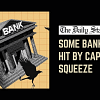Making money out of troubled water!

Out of my 26 years with three global banks, I spent more than half of it in treasury dealing room environment in Dhaka, Mumbai, Dubai, Singapore, Hong Kong, London, and New York.
Thanks to Pravat Gupta at ANZ Bank, Robert Green at Standard Chartered, and Kantic Dasgupta at Citibank, NA, I ended up doing a number of balance sheet management, financial institutions risk management and treasury risk management audits and reviews in or for those banks.
Many senior Bangladesh Bank officials always saw me as the right fit to teach the young officials at the central bank's foreign exchange regulation, investment or inspection departments.
Obviously, with the recent pressure on our local foreign exchange market rather forex markets across the world, young bank professionals, my students at the business schools, treasury personnel and business analysts are necessarily and mostly unnecessarily coming to me to know: 1) Where do I see US dollar/BDT in the near or distant future; 2) What is the right level for the dollar against the taka and more importantly for the business houses 3) How should they organise their activities with regard to timely import bills settlement? The other day even a journalist asked: How do we stabilise the forex market?
Now with this recent crackdown on a few banks by the central bank, rumours about more banks coming under their radar and corridor discussions that a few treasury seniors enjoying holidays outside the country during this critical time, the apprehensions are taking expanded shapes.
Most of the developing economies have seen reasonable to a large devaluation of their local currencies against the greenback. For some countries, it was as high as 50 per cent
I wish I had some straight answers (I am peeping at the book 'Good Economics for Hard Times' at the corner of my table)!
However, to put things in proper perspective, I would say most of the developing economies have seen reasonable to a large devaluation of their local currencies against the greenback. For some countries, it was as high as 50 per cent.
For Bangladesh, the scenario is not at all bad with our steady export growth, inward remittance hovering around $20 billion with quite reasonable foreign direct investment, and development assistance flows.
Our external debt/GDP ratio is still quite manageable with a ratio of around 43 per cent, while for India, it is around 70 per cent, and for Sri Lanka, it is 100 plus per cent.
Yes, there are some discussions that it may go much higher post-2023 once the large project loan repayments start. However, the upside is even during the peak of the coronavirus pandemic, Bangladesh didn't lose sight of its laundry lists regarding ease of doing business, liberalising the forex regime through the issuance of prudential guidelines at frequent intervals, and helping large and essential goods importers by releasing forex from its own coffer. Of course, more money is coming in to make the best use of the rising domestic consumer spending.
However, things were not possibly at all right when we saw the official taka rates were forcefully kept at a lower level ignoring the currency trends in other trading partner countries, the understanding gap to evaluate the outlier years of 2020 and 2021 when all the 'informal channels' of money transfer were not available, and the country saw inward remittance from non-residents to reach around $24 billion.
Now in the post-Covid or reasonably open economic activities, and amid weakness in political governance or crony capitalism-driven capital flights and very weak handling of the transition situation by the relevant agencies, the formal channel of money transfer came under tremendous pressure, at least for the time being. Globally accredited macro-economists would also put the 'lower than average inflation interest rate regime' on the possible 'culprits' lists.
My young banking friends also seemed to not like a few banks' treasurers being put on the dock due to their failure to understand the difference between profit and profiteering during troubled times. Most of them raised their eyebrows to ask what were their bosses or control and compliance departments doing.
A few also felt like the way UK and US regulators handled the 'Libor scam' or 'synthetic assets bubbles created by a few US banks and alleged banks should have been levied hefty penalties.
Let me end with a personal story.
Geoff Williams used to be the CEO of Standard Chartered Bangladesh when I used to run the bank's treasury in Dhaka. Treasury dealers are supposed to 'make or take advantage of the market fluctuations or volatility', no doubt about it. This is exactly the reason why all treasuries at global banks also appoint good macro-economists or technical resources to make market forecasts.
However, that, in no way, should influence the dealers to make an illogical profit by trying to befool the regulators (or taking advantage of their laxity) or market operators, and more importantly, ignorant or semi-ignorant clients.
While we wanted to take advantage of a semi-ignorant counterpart dealing bank on the possible USD appreciation and make windfall gain, Geoff Williams, the former audit head for the region and senior investigator in the 'Harshad Mehta scam' in India, forced us to unwind the deal and abide by all the central bank's guidelines regarding 'treasury dealing'.
How do we stabilise the forex market? Or what is the right level for the taka against the US dollar?
The simple answer would be: (1) Look at what the Reserve Bank of India or even the State Bank of Pakistan are doing; (2) Increase liquidity in the market or even informal market; (3) Follow a collaborative approach to narrow the gap between formal and informal market prices; (4) Keep encouraging non-residents and exporters; and (5) Improve visibility on the market operators and wrongdoers by applying some proven tools.
The author is an economic analyst.

 For all latest news, follow The Daily Star's Google News channel.
For all latest news, follow The Daily Star's Google News channel. 








Comments